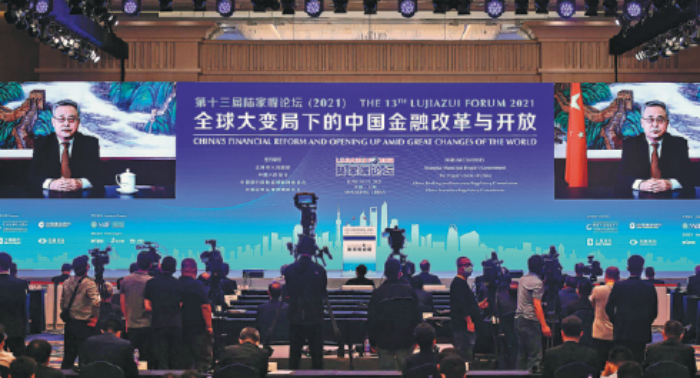Regulator calls for 'relentless' efforts to combat financial risks


Top banking and insurance regulator called for "relentless" efforts to combat financial risks on Thursday, even though financial instability has subsided in many areas.
Guo Shuqing, chairman of the China Banking and Insurance Regulatory Commission, said the country should "remain alert to dangers in times of calm and make restless efforts" in financial risk prevention, with five areas including bad assets and shadow banking worth particular attention.
China will actively deal with a possible rally in nonperforming loans, as the country has allowed repayment deferral of loans lent to smaller businesses hit by the COVID-19 and certain amounts of them will turn into bad assets, Guo said via video link at the 13th Lujiazui Forum 2021 in Shanghai on Thursday.
Credit risks facing the banking system are on the rise due to property bubbles in some regions, debt repayment pressure of a number of government financing platforms and growing default risks of some large and medium-sized companies. The risk situation of some small and medium-sized financial institutions is more severe, Guo said.
Banks must categorize their assets and increase loan loss provisions, so that they can dispose of nonperforming assets at a faster pace, he said. By the end of March, China's outstanding nonperforming loans stood at 3.6 trillion yuan ($563.4 billion), up 118.3 billion yuan from the beginning of the year. The banking system's nonperforming loan ratio came in at 1.89 percent, down 0.02 percentage point from the beginning of the year, according to official data.
Guo also vowed more efforts to implement the new asset-management rules, which aim to eradicate principal-protected wealth management products and reduce investment in nonstandardized assets, to prevent any resurgence in shadow banking activities.
The scale of China's shadow banking sector has decreased by 20 trillion yuan compared with its peak, but the sector remains large and can easily rebound, he said.
Moreover, the commission will firmly crack down on illegal public offerings of securities, prevent risks related to financial derivative investment and remain alert to Ponzi schemes, a kind of investment fraud that promises high returns with minimal risk, which could be disguised as financial technology, Guo said.
He reiterated the country's determination to financial opening-up and strengthening financial support for the real economy and small businesses.
"The most prominent task now is to further boost the share of direct financing," he said. Stock and bond financing, the main body of direct financing, accounted for about 37 percent in total new social financing last year, but the future room for growth remains huge.
To boost direct financing, it is critical to make clearer to stakeholders that avoiding bond repayments intentionally is a legal breach and even a crime. In addition, it is necessary to accelerate registration-based reform with information disclosure at the core, Guo said.



































